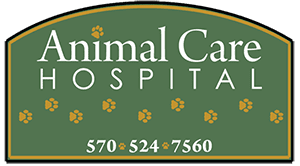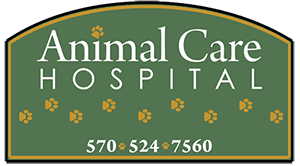CALL FOR MORE INFORMATION!
570-524-7560
570-524-7560
308 Hospital Dr., Lewisburg PA 17837 | achvetpa@gmail.com
8/10 of a mile behind Evangelical Hospital
Across from Kelly Elementary
Across from Kelly Elementary
CALL FOR MORE INFORMATION!
570-524-7560
570-524-7560
308 Hospital Dr., Lewisburg PA 17837 | achvetpa@gmail.com
8/10 of a mile behind Evangelical Hospital
Across from Kelly Elementary
Across from Kelly Elementary
COMPREHENSIVE VETERINARY SERVICES IN THE GREATER SUSQUEHANNA VALLEY, PA
Keeping your pet healthy is important to us. At Animal Care Hospital, we offer a wide range of services including medical, diagnostic, surgical, and preventive health care
needs for your pet so they live a longer, healthier, and happier life.
SURGICAL SERVICES
Our experienced veterinarians provide many surgical services at our clinic, ranging from routine to advanced procedures. Because we want to ensure that our patients receive the best possible outcome, we occasionally refer them to specialists (board-certified veterinary surgeons) to perform complex operations when advanced equipment or training will be beneficial. Our veterinary team takes every precaution so that your pet receives the highest-quality care. We perform a physical exam and preanesthetic testing before surgery, monitor your pet during surgery, and provide appropriate pain medication to keep your pet comfortable during recovery.
Making sure our patients remain safe during surgery and other medical procedures is extremely important to us. Our team of veterinarians and veterinary technicians is skilled in using anesthesia and monitoring patients to ensure their safety and provide the most comfortable experience. Anesthesia and patient monitoring vary greatly from clinic to clinic. You can be confident that we use the most effective and up-to-date protocols. The type of anesthesia we use depends on the procedure. Some require general anesthesia, while others may only call for local anesthesia. We also closely monitor every procedure, regardless of whether it's routine or more advanced. For more specific information on our protocols, please see the individual descriptions or contact us with any questions.
SPAYING
Spaying your pet has many benefits. The procedure, which prevents female animals from becoming pregnant and reproducing, can help your dog or cat live a longer, healthier life. Spaying will not change your pet's personality.
By spaying your female pet, you're protecting her against potentially deadly diseases, including bacterial infections, reproductive tract diseases, and several types of cancer. You also won't have to worry about her going into heat. This means avoiding the mess that often accompanies the heat cycle in female dogs and the pacing and crying that happens with female cats. In addition, spaying your pet will help control the dog and cat overpopulation problem, keeping more animals out of shelters.
Spaying, which involves removing the ovaries and uterus, is a surgical procedure and does need to be performed with the pet under anesthesia. We follow strict protocols and continually monitor your pet's vital signs to help ensure her safety. Please see the descriptions under Anesthesia and Patient Monitoring for more information on what we do to keep your pet safe.
To set up an appointment to have your pet spayed or to learn more about this procedure, call or visit our clinic. If you are struggling with the decision of whether to spay your pet, please call us so we can discuss your concerns.
NEUTERING
Neutering your pet has many benefits. The procedure, which prevents male animals from reproducing, can help your dog or cat live a longer, healthier life. Neutering will not change your pet's personality.
By neutering your pet, you're reducing or eliminating his risk for prostate and testicular cancer, as well as sexually transmitted diseases. Neutering will also reduce or eliminate undesirable and embarrassing behavior, including roaming, fighting, humping, and spraying. In addition, neutering your pet will help control the dog and cat overpopulation problem, keeping more animals out of shelters.
Neutering, which involves removing the testicles, is a surgical procedure and does need to be performed with the pet under anesthesia. We follow strict protocols and continually monitor your pet's vital signs to help ensure his safety. Please see the descriptions under Anesthesia and Patient Monitoring for more information on what we do to keep your pet safe.
To set up an appointment to have your pet neutered or to learn more about this procedure, please call or visit our clinic. If you are struggling with the decision of whether to neuter your pet, please call us or stop by so we can discuss your concerns.
SOFT TISSUE SURGERY
We perform many types of soft tissue surgeries at our clinic. Soft tissue surgeries are those that are not associated with bone. These surgeries can provide many benefits to pets.
Probably the most common soft tissue surgery performed on pets is the removal of masses, or lumps. Most of these masses, once removed and tested, are found to be benign (nonharmful); however, occasionally they are more serious. Early removal and accurate diagnosis of a lump is necessary to improve the outcome in your pet if the mass is cancerous.
Surgery can also help resolve several problems related to the eyes. Tearing in your pet's eyes can mean an infection is present or may be a sign that the cornea (outer layer of the eye) has been damaged. Surgery may allow the cornea to heal faster with less scarring, improving your pet's ability to see. In some pets, the eyelashes may actually damage the cornea. Surgical intervention improves comfort in these pets, reduces the chances of corneal scarring, and enhances the pet's vision in the long term.
Please contact us if you'd like to discuss how soft tissue surgery might be able to help your pet.
CAESARIAN SECTION
Most animals give birth without any complications. However, mothers occasionally need help with delivery. We usually attempt to resolve the problem using medical therapy first, but when that doesn't solve the issue, we will perform a caesarian section.
During a c-section, the mother is given an anesthetic. An incision is then made along her abdomen and through the uterus to retrieve unborn puppies or kittens. In some situations, we may recommend that the mother be spayed during this procedure, usually to prevent future problems of this nature.
PATIENT MONITORING
We monitor our patients closely to keep them as safe as possible during procedures that require general anesthesia. A veterinary technician will continually assess your pet's heart and respiratory rate, blood pressure, and other vital signs to help prevent any anesthetic risk.
Please feel free to ask us about our patient monitoring protocol or any concerns you might have about your pet's procedure. We'd be happy to discuss these matters in more detail.
GENERAL ANESTHESIA
For some procedures, your pet will need to be administered general anesthesia so that he or she will be unconscious and not feel pain. Many pet owners worry about their pets being administered general anesthesia. We can assure you that modern anesthesia is generally quite safe; to further lower any risk, we perform a physical examination and run blood work ahead of time to catch any underlying health issues. In addition, we follow a specific anesthetic protocol, including monitoring vital signs during the procedure, to ensure the safety of our patients.
We begin most general anesthetic procedures by administering a sedative to help the pet relax and decrease any anxiety and pain. We then administer an intravenous drug to provide complete anesthesia and place a breathing tube into the patient's trachea (windpipe). To maintain the state of unconsciousness, we deliver a gas anesthetic in combination with oxygen through the breathing tube.
Please contact us if you have any questions or concerns about your pet receiving general anesthesia or about the procedure for which your pet is scheduled.
LOCAL ANESTHESIA
If your pet is having a minor surgical or diagnostic procedure performed, we sometimes use a local anesthetic to help control pain. For example, when we perform a biopsy (in which a small portion of tissue is surgically removed so it can be examined), we often use a local anesthetic. Local anesthetics cause a loss of sensation in the area where the procedure is being performed. We sometimes use a sedative and/or anxiolytic (anti-anxiety medication) in combination with the local anesthetic to keep pets calm during a procedure.
Please contact us if you have any questions or concerns about your pet receiving local anesthesia or about the procedure for which your pet is scheduled.
EMERGENCY AND/OR EXTENDED CARE
CONTINUOUS CARE
We handle our own emergencies, so you can rely on us to provide your pet with continuous patient care.
For emergency services outside of our business hours, you may contact the Animal Emergency Center in Watsontown, PA at (570) 742-7400.
POCKET PETS
Our veterinarians are experienced in providing specialized care and treatment for exotic companion animals, including ferrets, gerbils, guinea pigs, hamsters, and rabbits. We understand their unique health needs and can provide diagnostic, therapeutic, and surgical services, as well as counseling on nutrition, behavior, and general care.
RABBITS
Rabbits are susceptible to a variety of diseases and conditions, including overgrown teeth, hairballs, parasites, and cancer. They also tend to hide signs of illness or pain.
Contact us if your rabbit:
- Has discharge from the eyes or nose, runny stool, or a gurgling stomach
- Has an elevated or low temperature
- Begins drooling, scratching at the ears, or sneezing
- Starts tilting his or her head
- Develops bald patches in his or her fur
- Stops eating, appears overly quiet, or shows other abnormal behavior
In addition, your rabbit can benefit from regular dental checkups. We can help make sure problems with your rabbit's teeth don't turn into serious, potentially life-threatening conditions.
We also strongly suggest that you have your rabbit spayed or neutered. Not only can rabbits potentially give birth once a month, but they can also have up to 14 babies at a time! Even in households with a single rabbit, spaying or neutering has plenty of benefits: It can protect your rabbit from several types of cancer and reduce or eliminate aggression, as well as other undesirable behavior, such as spraying, mounting, destructive chewing, and biting. Spaying or neutering will not change your rabbit's personality.
If you have any questions about how to best care for your rabbit, we'd be happy to discuss proper diet, housing, grooming, and even litterbox training.
GERBILS, GUINEA PIGS, AND HAMSTERS
Just because they're small doesn't mean they can't benefit from veterinary attention. Teeth, which grow continuously in gerbils, guinea pigs, and hamsters, often require trimming. (We can also recommend appropriate chew toys, which may help keep the teeth worn down.) Parasites such as lice, mites, and fleas can infest your pet. In addition, these companion animals can suffer from other health issues.
Call us if your pet stops eating, loses weight, appears quieter than normal, has discharge from the eyes or nose, or develops a lump on its body. We can provide treatment that fits within your budget.
FERRETS
You can help keep your ferret healthy by bringing him or her in for an exam once a year. That way, we can monitor any changes that occur in your pet and help prevent or catch diseases early, when they're easier to treat. As ferrets age, they may need additional testing and dental care.
Common problems associated with ferrets include gastrointestinal disease, parasites, and cancer. In addition, ferrets are inquisitive creatures by nature and frequently ingest objects they shouldn't. Regular blood tests can help determine whether your ferret has any problems with the kidneys, liver, or pancreas.
Ferrets can also benefit from receiving certain vaccinations and monthly preventives, which we'd be happy to discuss with you during your visit. Please bring a stool sample to your ferret's annual exam so we can test for internal parasites.
Unless you are planning to breed your ferret, we recommend that he or she be spayed or neutered. Female ferrets, or jills, do not need to give birth once to stay healthy. In fact, spaying can save a ferret's life. Jills that haven't been spayed will stay in heat until they're bred. This condition can cause anemia (a decrease in red blood cells), which can be fatal. In male ferrets, neutering can reduce their strong body odor, prevent marking, and reduce aggressive behavior.
Please contact us right away if your ferret develops any unusual symptoms, such as vomiting, diarrhea, hair loss, lack of appetite, trouble breathing, black ear wax, discharge from the eyes or nose, lumps, swelling, or an increase in aggression or sexual behavior (especially in neutered males).
GROOMING
We can recommend a bath after we've examined your pet and diagnosed the problem. Illnesses unrelated to the skin, such as thyroid disease, can also cause skin problems in pets, so we want to be sure we're treating the root of the problem, not just a symptom. Call us so we can help your pet feel better.
TECHNICIAN VISITS
ANAL GLAND EXPRESSION
NAIL TRIMS
HEALTH SCREENING TESTS
VON WILLEBRAND'S DISEASE
Knowing if your dog has this condition before an emergency situation arises can mean the difference between life and death. Similar to hemophilia in humans, von Willebrand's disease can result in life-threatening bleeding. Many dogs that carry this disease in their genetic makeup go undetected until a minor surgery or small, superficial injury results in significant blood loss.
We offer testing for this disease, which is a highly inheritable trait in some breeds. As many as 50% of Dobermans are affected; other commonly affected breeds include German shepherds, German shorthaired and wirehaired pointers, golden and Chesapeake Bay retrievers, Pembroke Welsh corgis, poodles, Scottish and Manchester terriers, and Shetland sheepdogs. If you have an at-risk breed, we recommend that you have your dog tested.
Some animals show no signs of the disease but are carriers of this genetic problem. If these dogs are allowed to reproduce, they can pass the disease on to their offspring. If you are a breeder, we strongly recommend testing for Von Willebrand's disease before breeding your dogs. Please call us to schedule this test.
RENAL DYSPLASIA
Renal dysplasia is a disorder in which the kidneys do not develop normally. It most commonly affects Shih Tzus, Lhasa apsos, and soft-coated wheaten terriers. Dogs usually become clinically ill before one year of age.
Unfortunately, this genetic disease has no cure; many affected dogs will develop kidney failure. Management options are extremely limited and generally expensive. Although some dogs are only carriers of this disorder and have normal kidney function, they can still pass the trait onto their offspring.
If you're a breeder, testing for renal dysplasia can significantly reduce your chances of breeding this inherited problem in your dogs. Please call us to schedule this test.
HIP DYSPLASIA
Canine hip dysplasia (abnormal development of the hip joint) begins when the hip joint in a young dog becomes loose or unstable. If left undiagnosed and untreated, this instability causes abnormal wear of the hip cartilage and ultimately progresses to osteoarthritis or degenerative joint disease. Signs of this condition are pain, reluctance to get up or exercise, difficulty climbing stairs, a “bunny-hopping” gait, limping, and lameness, especially after periods of inactivity or exercise.
Hip dysplasia most commonly affects large- and giant-breed dogs; however, smaller dogs can also be affected. Although genetics often play a role in this disorder, young dogs that grow or gain weight too quickly or get too much high-impact exercise are also at risk. Being overweight can aggravate hip dysplasia.
We can help prevent or slow this condition by monitoring food intake and ensuring that your dog gets proper exercise as he or she ages. We can also screen your dog for hip dysplasia, using one of two methods. The earlier we can diagnose hip dysplasia, the better the possible outcome for your dog.
OFA (ORTHOPEDIC FOUNDATION FOR ANIMALS) CERTIFICATION:
We can x-ray your dog's hips for hip dysplasia at 2 years of age. We will forward these radiographs to the OFA, where board-certified radiologists will evaluate and grade your dog's hips for OFA certification. Correct positioning of your dog is essential for proper radiographic evaluation, so a general anesthetic is required to make the procedure less stressful for him or her.
PENNHIP METHOD:
We can x-ray your dog's hips using the PennHIP method for evaluating hip dysplasia in dogs, which can be performed much earlier (at 16 weeks of age) than OFA certification. Requiring a general anesthetic, it involves x-raying your dog's hips in three different positions to measure how loose the joints are and determine the presence or likelihood of osteoarthritis. If you are a breeder, consider using this test to help you select good breeding candidates at a younger age. If your dog competes athletically, consider using this technique to evaluate the future soundness of your dogs or puppies.
Please call us to discuss your dog's risk of developing hip dysplasia, to schedule a screening, or to discuss treatment options.
MEDICAL SERVICES
If your pet needs medical assistance, you can feel confident turning to us. Our knowledgeable staff and modern facilities are equipped to handle a wide variety of medical conditions, including emergencies. Because we can perform many diagnostic procedures in-house, we can often give you immediate answers and start treating your pet faster. In some cases, your pet may require hospitalization and further diagnostic tests. Please take a look at the more detailed descriptions of medical services we offer, or call us to discuss your pet's needs.
RADIOLOGY (X-RAYS)
When we need to figure out what's wrong with your pet, we routinely use x-rays to help identify the cause of the problem, rule out possible problems, or provide a list of possible causes. We may also use x-rays during a wellness exam to diagnose potential problems before they become serious.
X-rays provide valuable information about a pet's bones, gastrointestinal tract (stomach, intestines, colon), respiratory tract (lungs), heart, and genitourinary system (bladder, prostate). We use radiology alone or in conjunction with other diagnostic tools. Interpretation of radiographs requires great skill on the part of the veterinarian.
We are proud to offer digital radiology (x-rays that are captured digitally rather than on film). This state-of-the-art technology allows us to provide you with a quicker diagnosis for your pet. Plus, it uses less radiation than traditional x-rays.
To avoid a blurry image, pets need to remain completely still while an x-ray is taken. In some cases, we may need to sedate your pet or use short-acting general anesthesia.
If you have any questions about our radiology service or what to expect during your pet's procedure, please don't hesitate to ask.
FLEA CONTROL
A flea problem on your pet means a flea problem in your home. Understanding the flea life cycle and methods for its control can be a daunting task. We will gladly assist you in this process. We can provide you with safe, effective flea prevention and if necessary, flea treatment. See the flea article in the Pet Health Library of our site.
DERMATOLOGY (SKIN)
Skin problems are common in dogs and cats and can be caused by hormonal disorders, allergies, infections, or parasites such as fleas and mites. These issues can be particularly difficult to treat and should be addressed promptly.
We can often diagnose a skin problem by simply examining your pet. Some dermatologic diseases or conditions do require additional diagnostic procedures to ensure a correct diagnosis. Depending on your pet's symptoms and the results of our physical exam, we may run blood work or perform a urinalysis, skin scraping, or biopsies.
Contact us if you notice your dog or cat scratching excessively or if he or she develops any bare patches, scabs, scaling, redness, inflammation, lumps, or bumps.
CARDIOLOGY (HEART)
Although heart problems are found more often in older pets, these conditions can affect pets at any age. Heart disease is usually a life-threatening condition, but early diagnosis and appropriate therapy can extend your pet's life. If caught soon enough, some forms of heart disease can be cured.
Heart disease can lead to congestive heart failure (CHF), which occurs when the heart can no longer pump blood effectively. If an animal is suffering from CHF, fluid usually accumulates in and around the lungs and sometimes in the abdomen. Congenital heart disease (animals born with a heart problem), valvular heart disease (abnormalities of the heart valves), arrhythmias (rhythm disturbances), and heartworm disease can all lead to CHF.
Call us if your pet starts breathing rapidly or coughing, loses his or her appetite, tires easily, seems weak, or has trouble exercising. We can discover many heart problems during a physical exam. Additional tests, such as an electrocardiogram (ECG), radiographs (x-rays), and ultrasounds, are usually needed to accurately identify the cause of the heart disease or failure.
ULTRASONOGRAPHY
Ultrasonography (also called ultrasound or sonography) is a noninvasive, pain-free procedure that uses sound waves to examine a pet's internal organs and other structures inside the body. It can be used to evaluate the animal's heart, kidneys, liver, gallbladder, and bladder; to detect fluid, cysts, tumors, or abscesses; and to confirm pregnancy or monitor an ongoing pregnancy.
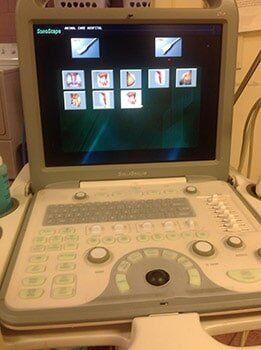
We may use this imaging technique in conjunction with radiography (x-rays) and other diagnostic methods to ensure a proper diagnosis. Interpretation of ultrasound images requires great skill on the part of the clinician.
The ultrasonographer applies gel to the surface of the body and then methodically moves a transducer (a small handheld tool) across the skin to record images of the area of interest. The gel helps the transducer slide more easily and create a more accurate visual image.
The transducer emits ultrasonic sound waves, which are directed into the body toward the structures to be examined. The waves create echoes of varying degrees depending on the density of the tissue and amount of fluid present. Those waves create detailed images of the structures, which are shown on a monitor and recorded for evaluation.
Ultrasound does not involve radiation, has no known side effects, and doesn't typically require pets to be sedated or anesthetized. The hair in the area to be examined usually needs to be shaved so the ultrasonographer can obtain the best result.
If you have any questions about our ultrasonography service or what to expect during your pet's procedure, please don't hesitate to ask.
Identifying endocrine problems as early as possible is important in dogs and cats. These serious, potentially life-threatening conditions are much more manageable when caught early, allowing us to begin proper treatment.
The endocrine system is made up of a group of tissues (mostly glands) that release hormones into the bloodstream. These hormones regulate metabolism, growth, development, and reproduction and are dispersed to different areas of the body, depending on the hormone's function. When a hormonal balance is disturbed (by a tumor or autoimmune disease, for instance), an endocrine disorder can develop. “Hyper” refers to an excess of hormone, and “hypo” refers to a deficiency in a hormone. Treatment varies depending on the disease.
There are several common endocrine disorders found in dogs and cats:
- Diabetes mellitus is caused by a deficiency in or resistance to the hormone insulin.
- Hypothyroidism, which is often diagnosed in dogs, indicates that the animal has low levels of thyroid hormone.
- Hyperthyroidism, which frequently affects cats, indicates that the animal has high levels of thyroid hormones.
- Addison's disease (hypoadrenocorticism) and Cushing's disease (hyperadrenocorticism) can also affect both species, although Cushing's disease is rare in cats.
Contact us if your pet begins panting excessively, develops any skin issues (such as hair loss or dull coat), or shows any changes in behavior, energy levels, appetite, weight, water consumption, or urination.

MEDICAL ASSESSMENT
To ensure a proper diagnosis, we often need to examine your pet. We begin a medical assessment by looking at your pet's eyes, ears, and skin and checking his or her cardiovascular, neurological, gastrointestinal, and skeletal systems for any abnormalities. We will perform blood and/or urine tests as necessary to check your pet's kidneys, liver, pancreas, and endocrine system, including the thyroid and adrenal glands. Based on your pet's condition, we may recommend further diagnostic tests, such as radiography (x-rays), endoscopy (internal scoping), ultrasound, or biopsy.
If you're concerned that something may be wrong with your pet, please call us to schedule a medical assessment. Depending on the symptoms, we may ask you to bring in your pet right away.
NUTRITIONAL COUNSELING
If your adult dog or cat is healthy, you may have chosen a pet food based simply on whether or not your pet will eat it. Cost may also play a factor in your decision. However, not all pet foods are equal. And feeding the right amount is not as simple as following the directions on the package (they're just guidelines). Choosing an appropriate diet can set your pet on a path of lifelong good nutrition and help prevent many problems, including allergies, nutritional deficiencies, skin and coat disorders, and obesity. Nutritional requirements for dogs and cats vary depending on a variety of factors, including age, breed, and health. For instance, senior pets have significantly different requirements than puppies or kittens, and animals with diabetes, kidney disease, and other health conditions can benefit from special diets. Our veterinarians can help you make informed decisions about your pet's diet. We can counsel you on which foods are the best choices based on your pet's needs and your financial considerations, how much to feed, and even how to decode pet food labels. We can create a nutrition plan specifically for your pet, and we're also happy to work with owners to help their overweight pets get down to a healthy weight. Call us to set up a personalized nutrition consultation for you and your pet.
GIANT BREEDS
Giant breeds such as Great Danes, Irish wolfhounds, and giant schnauzers have unique dietary requirements. Very few commercial puppy foods offer the ideal mix of calcium, energy, and protein levels that these breeds need. We can provide you with feeding recommendations that will encourage your dog's maximum growth potential without causing developmental problems. For added convenience, we also stock veterinary-approved diets for giant breeds.
Please don't hesitate to contact us if you have any concerns regarding your dog's nutrition or if you would simply like to discuss this topic with us.
PUPPIES/KITTENS
It's easy to get confused or overwhelmed by all the pet foods on the market. We can help you weed through the choices and find a puppy or kitten food that will meet your growing pet's specific nutritional needs. We even carry many nutritionally balanced, veterinary-approved brands in our clinic.
Feel free to ask us for a food recommendation or to contact us with any nutrition questions or concerns you might have. We're happy to help!
PET SUPPLIES
We carry a variety of pet supplies to provide you with a selection of safe, vet-approved pet food, supplements, treats, toys, and accessories. Feel free to ask us any questions you might have about these products.
With so many accessories available from pet stores, we know you have hundreds of options to choose from. However, not all of them are safe for pets. When you purchase accessories from us, you know they've been carefully selected with your pet's safety in mind. Plus, we have the experience and expertise to help guide you toward the right choices for your pet.
We carry a variety of collars, leashes, and harnesses that are specifically designed to keep your pet safe and comfortable. Our halter devices can help you train your dog, making walks much more pleasant—without all the pulling. When you buy one of our halters, we include a “how to” lesson from a canine behavior expert.
Stop by to check out the accessories and toys in our reception area, or feel free to browse our selection during your next visit. Maybe you'll find your pet's new favorite toy!
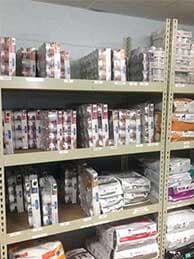
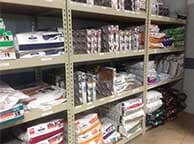
BROWSE OUR WEBSITE
CONTACT INFORMATION






HOURS OF OPERATION
Hours of Operation:
- Mon - Thu
- -
- Friday
- -
- Sat - Sun
- Closed
CONTACT INFORMATION






HOURS OF OPERATION
Hours of Operation:
- Mon - Thu
- -
- Friday
- -
- Sat - Sun
- Closed
Content, including images, displayed on this website is protected by copyright laws. Downloading, republication, retransmission or reproduction of content on this website is strictly prohibited.
Terms of Use |
Privacy Policy
